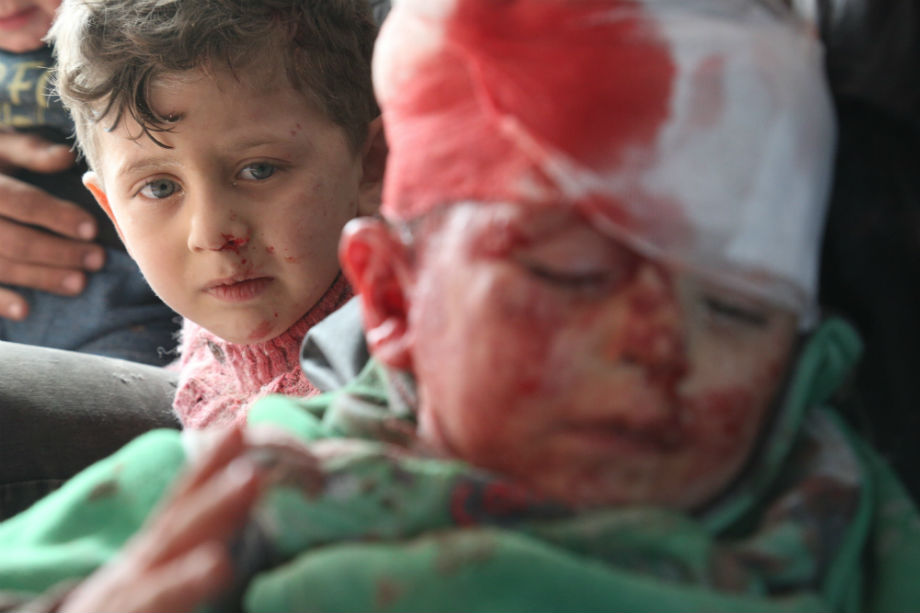Ever since Assad’s regime recaptured the majority of the opposition held territories across the country, Idleb has served as a haven for the majority of displaced families once involved in the uprising, unable to return home and forced to remain displaced in domestic exile.
Idleb has been one of the main issues at international negotiations, with Russia aiming to resolve what Moscow calls “the last rebel pocket”.
The Sochi agreement, launched in September 2018, established a buffer zone with Russia and Turkey running joint patrols in the area between rebel-held and Assad-held territory.
But despite the agreement, Syrian troops have been bolstered by Iranian militants, recently moved from Damascus – reportedly after Russian orders – and moved towards the infamous T-4 airbase and Idleb’s frontlines.
The militants have been significantly increasing their attacks against Idleb’s rural enclave, where the death toll has continued to grow, according to the Syrian Observatory for Human Rights.
The largest bakery in Khan Sheikhoun has been devastated after it was deliberately targeted in a recent bombing, which killed four civilians.
“This bakery is the only one of its kind in the area,” local activist Bahr Shaheen told Al-Araby al-Jadeed. “People from inside and outside the town would come in the morning and throughout day to buy their bread – it was deliberately targeted by Assad’s militants, something that he’s done before.
“Assad’s militants are targeting vital facilities. Now they devastated our bakeries, later they’ll attack hospitals and schools.”
Thousands of families who have already fled from Aleppo, Homs, Ghouta and Daara have had no choice but to leave their shelters under fire and become displaced for a second or third time.
Fawaz Haj Alo is a father-of-three who fled from Arbin in eastern Ghouta last April and settled in al-Teh, a town in the Idleb area with his family.
But the local council has announced a state of emergency after declaring a “catastrophic situation” in the majority of Idleb’s southern countryside.
“Since we arrived in this town we’ve been trying to establish a way to earn a living and resume our lives. We were, despite the desperate circumstances, able to survive,” Fawaz told Al-Araby al-Jadeed.
“However, we were forced to leave the town. The bombing has always been random and sudden; it hasn’t stopped since last year, but massively increased in the past few months.
“Our house and our neighbours’ house was hit during the attacks. My son’s leg had previously been wounded by shrapnel. As a result, we had to move to the Salqin camp near the border.
“I call on everyone to help us, it’s unbearable here in these camps, there are no NGOs and no food. Just stop the bombing, so we go back to our town.”
Many civilians in Idleb’s towns remain under fire, taking shelter and unwilling to leave their homes, taking daily risks out of a sense of despair and a lack of alternatives.
“Where would we go? The borders and camps are full of refugees, we can’t find an empty tent or shelter,” said Salem Obayda, a teacher living in Maratnomn.
The town has come under daily artillery fire, with many families forced to leave the southern part of the city, heading towards the camps on the border.
“The attacks and a lack of underground schools forced them to halt all education,” says Salem. “I prefer to stay rather, than live in the border camps.
Amid the devastation and rubble, volunteers from Syria’s Civil Defense Corps, known as The White Helmets, have been doing what they can to save lives.
“The White Helmets have been carrying out non-stop rescue efforts to help civilians affected by Assad’s relentless offensive,” Mohammad Abdoullah, a White Helmet volunteer in northern Syria told Al-Araby al-Jadeed.
“Our teams have been at full capacity across northern Syria’s towns,” he added.
“There have been indiscriminate attacks against civilian areas, killing unarmed people – nevertheless, our medical and rescue teams are working on the ground, day and night.
“Most of the deaths and injuries have been women and children,” added Abdoullah. “We’ve been taking risks and pulling dead, severely injured and burned bodies from beneath collapsed buildings.”
Hospitals and makeshift medical centres across northern Syria have been over-crowded with patients. Many have been moved to Turkish hospitals due to a lack of equipment.
“In spite of the recent cuts to medical funds, we’re still able to function and run the hospitals to treat the large numbers of patients we’ve been receiving,” said D.Feras al-Jonde, the Health Minister in the Azaz-based Syrian Interim Government formed by the National Coalition for Syrian Revolutionary and Opposition Forces.
“On the other hand, the available medical support isn’t sustainable and [treatment] can’t continue to be carried out as efficiently as it is at the moment, since we’re running low on medical resources,” said Jonde.
“We place the responsibility for the catastrophic consequences of the medical cuts on the international community – who must understand what the upcoming shut-down of our medical facilities would mean.
“The donors must be aware that they are putting more than 3.5 million civilians at risk of losing their right to medical treatment.”
This article was edited by The Syrian Observer. Responsibility for the information and views set out in this article lies entirely with the author.


